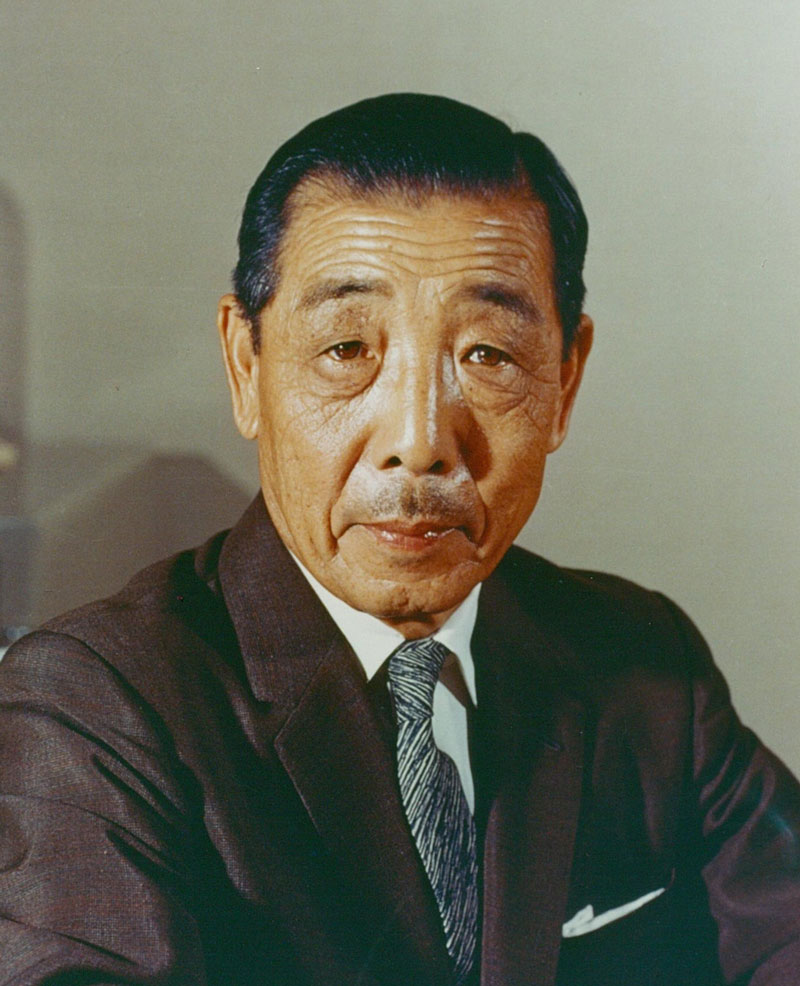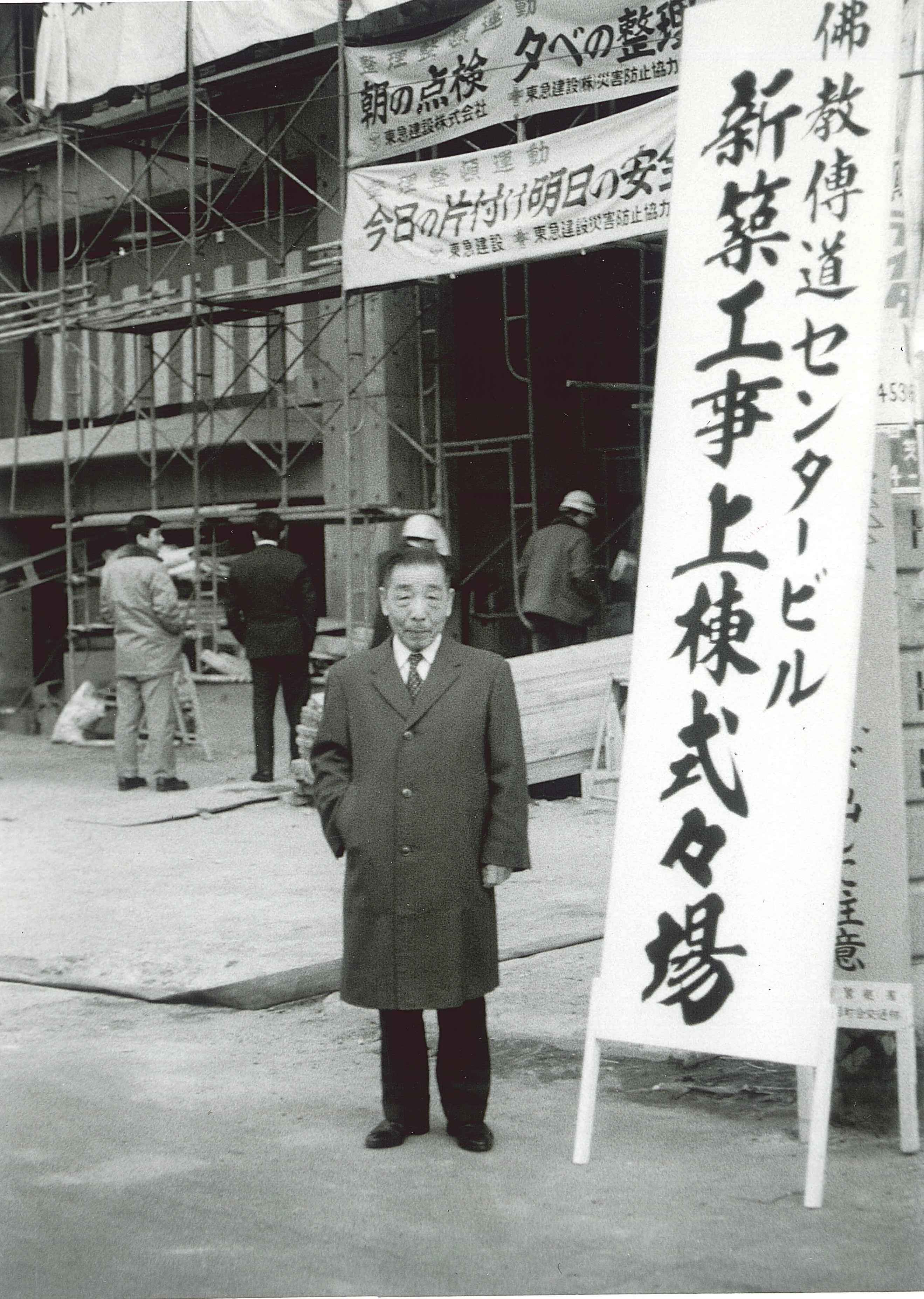
In 1965, Bukkyo Dendo Kyokai (BDK - Society for the Promotion of Buddhism) was established by the late Rev. Dr. Yehan Numata, the founder of Mitutoyo Corporation. His fervent wish was to spread the teaching of Śakyamuni Buddha throughout the world. From that time on, BDK has diligently been translating and distributing “The Teaching of Buddha” with the support and cooperation of like minded individuals and organizations.
The Japanese Government has officially approved BDK to be recognized as a “Public Interest Incorporated Foundation” and this fresh new start for BDK began on April 1, 2013.
Rev. Dr. Yehan Numata
 In describing Bukkyo Dendo Kyokai, it is essential to speak of the businessman and gentleman, Yehan Numata (1897-1994), the founder of Mitutoyo Corporation.
In describing Bukkyo Dendo Kyokai, it is essential to speak of the businessman and gentleman, Yehan Numata (1897-1994), the founder of Mitutoyo Corporation.
He established a company to manufacture precise measuring instruments in 1934. His solid conviction was that the success of an enterprise depends on the harmonious association of Heaven, Earth and Human, and that the perfection of the human mind is attainable only through a well-balanced coordination of wisdom, benevolence and valor. He did everything he could, under this conviction, towards the technical improvement of measuring instrument manufacturing and the development of the human mind.
It was his belief that the attainment of world peace is possible only by the perfection of the human mind which can be educated and benefited from the teachings of the Buddha. Therefore, along with managing his business enterprise, he exerted his efforts toward the spreading and modernization of Buddhist music, pictures and teachings.
In December 1965, he had a foundation incorporated with his private funds to engage in the propagation of Buddhism, and at the same time, to be an aid towards world peace. Thus, he initiated Bukkyo Dendo Kyokai as a public organization.
Simplified History of the Late Rev. Dr. Yehan Numata's
| 1897 |
Born in Hiroshima Prefecture, Japan |
| 1916 |
Relocated to Hawaii as a Hongwanji minister |
| 1925 |
Published the English magazine, “The Pacific World” |
| 1928 |
Graduated with Masters Degree from University of California, Berkeley |
| 1930 |
Appointed as statistician in the Japanese Ministry of Resources |
| 1934 |
Established the Mitutoyo Manufacturing Company |
| 1938 |
Appointed CEO of Mitutoyo |
| 1959 |
Appointed as a board member of Musashino Jogakuin Junior & Senior High School |
| 1961 |
Received "The Blue Ribbon Medals of Honor" from the Japanese Government |
| 1963 |
Appointed as a Senior Adviser of Japan Measuring Instruments Federation |
| 1965 |
Establishment of the Bukkyo Dendo Kyokai Appointed as a board member of Bukkyo Dendo Kyokai |
| 1967 |
Received “4th Class, Order of the Rising Sun, Gold rays with Rosette” |
| 1968 |
Appointed as chairperson of Mitutoyo |
| 1969 |
Appointed as director of Japan Precision Measuring Instruments Manufacturers Association |
| 1977 |
Received Honor of Jōdo Shinshū Hongwanji-ha Kyōgaku Grant-Making Foundations |
| 1985 |
Appointed as Executive Adviser of Mitutoyo |
| 1987 |
Received Higashi Hiroshima City Medal |
| 1988 |
Appointed Honorary Ph.D. from University of Hawaii |
| 1991 |
Received Honorary Ph.D. from Ryukoku University |
| 1994 |
Passed away at the age of 97 on May 5 |
BDK's mission is to contribute the advancement and improvement of human welfare and world peace by promoting the Buddhist essences of compassion, interconnectedness, culture and research that are the foundation of Japanese culture. BDK desires to provide a modern interpretation of the Buddha's teaching and to create a more compassionate humanity through its global educational programs, and working towards contributing to the advancement of modern society. In order to achieve these purposes, BDK is actively involved in the following:
- Creating and compiling a contemporary understanding of the Buddha's teachings and providing foreign-language translations of various Buddhist texts and their dissemination.
- Providing financial assistance and organizing a commendation award program to recognize outstanding individuals involved in promoting the Buddhist spirit, culture and studies.
- Support education programs which advance the Buddhist spirit and culture and its study.
- Provide physical facilities to conduct programs for the advancement of Buddhist culture.
- Other projects as needed and developed to support the mission of this organization.



 In describing Bukkyo Dendo Kyokai, it is essential to speak of the businessman and gentleman, Yehan Numata (1897-1994), the founder of Mitutoyo Corporation.
In describing Bukkyo Dendo Kyokai, it is essential to speak of the businessman and gentleman, Yehan Numata (1897-1994), the founder of Mitutoyo Corporation.